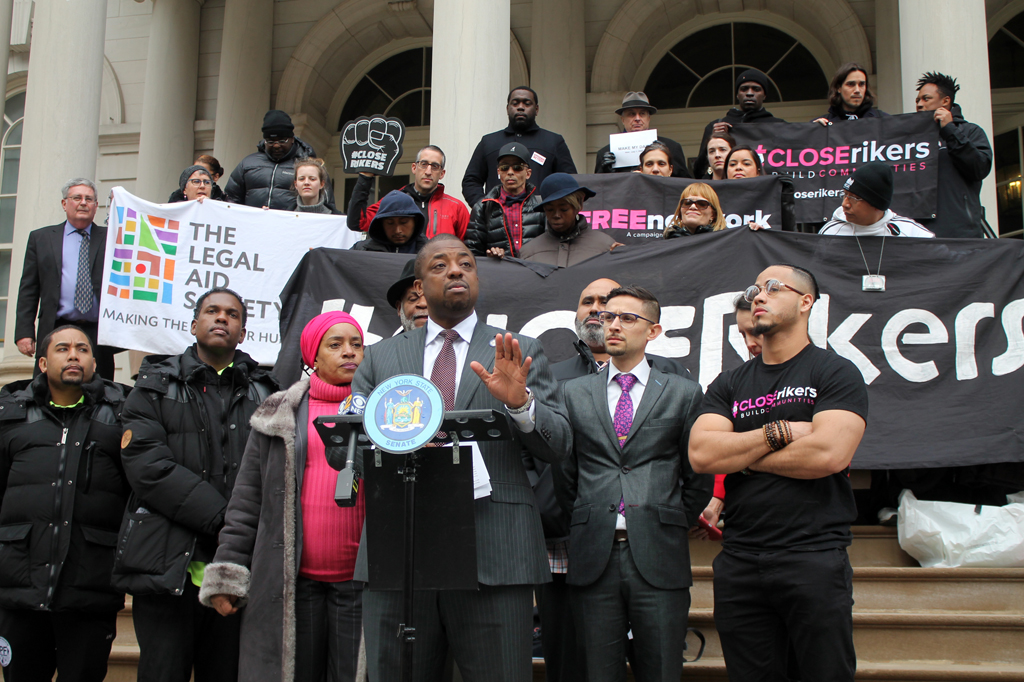NEW YORK — A damning report out of Albany and a surprise announcement by Mayor Bill de Blasio have renewed hopes among activists and advocates that the long-sought goal of shutting down Rikers Island could come sooner than expected.
The move would affect the 120 juveniles currently imprisoned there.
The city plans to transfer all inmates to other facilities that will open in Brooklyn, Queens, Manhattan and the Bronx.
 Now that the state Commission on Correction has reported that violent crimes at the Rikers Island jail complex increased in the past year, New York state may accelerate the mayor’s 10-year plan and close it in just three years.
Now that the state Commission on Correction has reported that violent crimes at the Rikers Island jail complex increased in the past year, New York state may accelerate the mayor’s 10-year plan and close it in just three years.
The shuttering of Rikers Island, the largest jail complex in the country, has been the goal of many criminal justice and juvenile and reform activists for years. Advocates say Rikers Island does nothing to steer young people away from crime and in fact inculcates a culture of violence that is perpetuated once they get out.
Mary Lynne Werlwas, director of the prisoners’ rights project at The Legal Aid Society, said Wednesday she wants to make sure that whatever plan the city implements, Rikers’ culture of violence isn’t exported to the new jails. “We don’t need to move the violence culture around,” said Werlwas at press conferences by the mayor, city council members, city employees and advocates.
Preventing violence within the facilities would lower recidivism, said advocates and Democratic state Sen. Brian Benjamin.
Benjamin also said he wants to advocate for funding that's not currently in the state budget to continue Close to Home, a program that keeps incarcerated New Yorkers in facilities that are accessible for their families.
It is unclear who would run programs for juveniles offering education, vocational programming and therapeutic services, Werlwas said.
“It could be the Department of Correction or the Administration for Children's Services or both,” she said.
The same day the commission delivered its report to the governor’s office and the state legislature in Albany, de Blasio announced the location of the four sites where Rikers inmates will be transferred.
Four community jails, including an entirely new one in the Bronx, are central elements of the city plan, city officials said Wednesday. Updates to the Manhattan Detention Complex and the Brooklyn House Detention center and the re-establishment of an empty detention center in Queens will provide enough space as long as the city’s prison population continues to shrink, city officials said.
Closing Rikers in three years instead of 10 “is not about politics. This about lives. This is about humanity. This is about people who are neighbors, who are family members, who are friends,” said former City Council Speaker Melissa Mark-Viverito. During her tenure she had spearheaded the formation of the commission whose recommendations resulted in the original decision to close Rikers Island.
The chair of the committee on criminal justice, which has oversight of Rikers, showed support for the three-year schedule. The commission report, Council Member Keith Powers said, will give the city a concrete opportunity to close Rikers.
The Wednesday announcement took many by surprise on the heels of de Blasio’s state of the city address Tuesday night, during which he did not mention the possibly shorter timeline or announce the locations of the four new sites.
Bronx Borough President Ruben Diaz Jr., who was not at Wednesday’s press conference, expressed concern about the announcement of a new jail in his district that he had not been made aware of.
“I hope that, going forward, this lack of outreach is not a harbinger of the amount of community input the people of my borough will have in this process,” he said in a statement.
Hello. We have a small favor to ask. Advertising revenues across the media are falling fast. You can see why we need to ask for your help. Our independent journalism on the juvenile justice system takes a lot of time, money and hard work to produce. But we believe it’s crucial — and we think you agree.
If everyone who reads our reporting helps to pay for it, our future would be much more secure. Every bit helps.
Thanks for listening.
